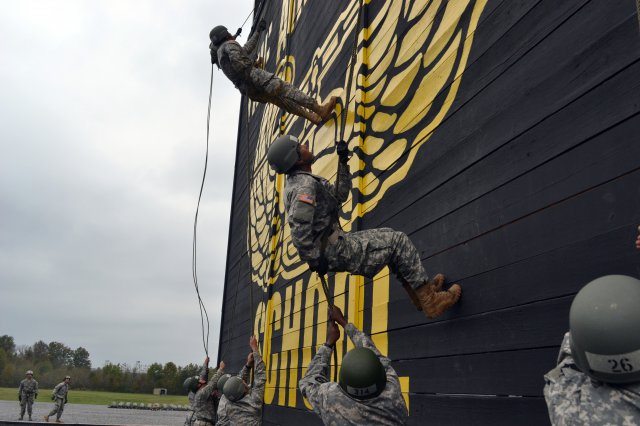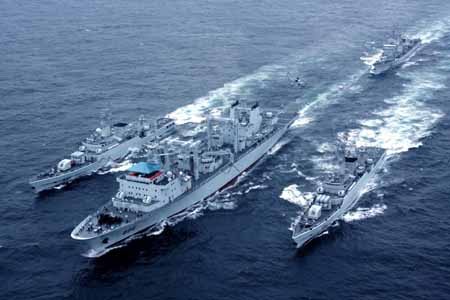Maj. Gen. James McConville, the commanding general of the 101st Airborne Division, at Fort Campbell, Ky., issued an order in July to increase the number of Air Assault-qualified Soldiers within the next three years.
“Seventy percent of the Division will be Air Assault qualified,” said Capt. James B. Prisock, the commander of the Sabalauski Air Assault School at Fort Campbell. “That means, with about a 30 percent turnover annually, the standard is every Soldier who’s been in the division over a year will go to Air Assault School. The standards of the Air Assault course are the baseline standards the division commander set for the division.”
The ideal qualities of the Air Assault School candidate align with the Army’s expectations of Soldiers — fit, trained and disciplined, three qualities the 159th CAB uses to define a Thunder Warrior.
Col. Jimmy Blackmon, the commander of the 159th Combat Aviation Brigade, said Soldiers of the 159th CAB should be physically and mentally fit, capable of operating at their maximum potential.
These qualities are the foundation of what a Soldier needs to prosper, but Sgt. Jose Calderon, the medical noncommissioned officer in charge with 7th Squadron, 17th Cavalry Regiment, said being driven, punctual and eager to learn are important traits, too.
“Being determined plays a part — you have to be determined to get through,” he said. “You have to have the drive to better yourself, to improve.”
Maj. Nathan Surrey, the deputy commanding officer for 159th CAB, said the brigade has begun preparing Soldiers to attend the Air Assault School by raising the bar for Soldiers. In addition to more intensive training, there has been more emphasis on holding Soldiers more accountable and pushing them to meet, if not exceed, standards.
The 10-day Air Assault School teaches Soldiers the basic technical and tactical aspects of doing air assault operations.
The course challenges Soldiers in three ways.
“We challenge the Soldiers physically, to make sure they can meet the physical standards set by the Division,” Prisock said.
Day zero, candidates must complete an obstacle course and a two-mile run, but brawn is only part of the school’s challenge.
“You’ve been recommended because you can handle the physical part, but it’s the mental part that gets a lot of Soldiers,” Calderon said. “Be mentally prepared.”
Soldiers are put under stress to see how well they do mentally, as well.
“There’s the anxiety of having to inspect a load under a time standard while someone’s watching you, and it’s for a grade,” Prisock said.
Calderon said just learning the material is not enough. Being able to communicate ideas with others and work as a team are critical to the success of the mission.
The trifecta is not complete without discipline.
An extremely meticulous inspection is the Soldier’s first test of the attention to detail required. It serves as an indicator of whether the Soldier is capable of maintaining the standards of the course. If any item is missing from the packing list, the Soldier is not allowed to in-process.
“You have to be detail-oriented, you have to know the steps and sequences, and the teamwork is part of the mental part because you have to get along with everybody, all the members of your team. You have to rely on them and trust them,” Calderon said. “If you miss one detail, it could be detrimental to the mission — loss of the bird, equipment, supplies, or the loss of a life, for that matter.”
Surrey said these qualities — fit, trained and disciplined — create trust and respect among members of the unit, creating cohesiveness.
All three aspects are required to be successful in becoming Air Assault qualified.
“You can be really strong in one or two areas, but if you’re deficient in another, then you’re going to wind up not being successful, and you’ll have to come back and try again,” Prisock said.
The Air Assault School gives more than educational and physical benefits — it gives Soldiers self-confidence.
“Becoming Air Assault qualified meant a lot to me,” said Spc. Taner Elson, an intelligence analyst with Headquarters and Headquarters Company, 159th Combat Aviation Brigade, “Not only becoming qualified, but knowing I completed and succeeded through the course, knowing I did my best and pushed myself through all the obstacles the course (required), knowing that I could accomplish anything I set my mind to.”
Elson’s feelings are representative of numerous Air Assault School graduates.
“I know I can function under any situation,” Calderon said. “Under duress, I’d be able to function. Going through the course is a good experience. Soldiers don’t know what their bodies can take until they push (themselves) to the limit.”
With nearly three-quarters of the 101st Airborne Division slated to become Air Assault qualified, Fort Campbell Soldiers may be the front-runner for tomorrow’s Army.
“It’s not a matter of who a commander should send, but a matter of the commander should be getting every Soldier ready to go, making sure they’re training the prerequisites, and of course, the (physical training) test, the 12-mile foot march, and making sure all their Soldiers are ready,” Prisock said.
“You’re going to see a lot more ruck marching going on, more trips to the obstacle course, as these are (Air Assault course) prerequisites,” Surrey said. “Events like these build confidence, discipline and fitness.”











